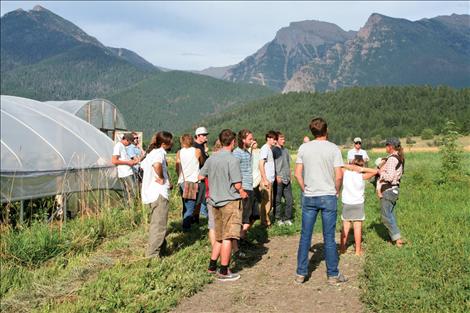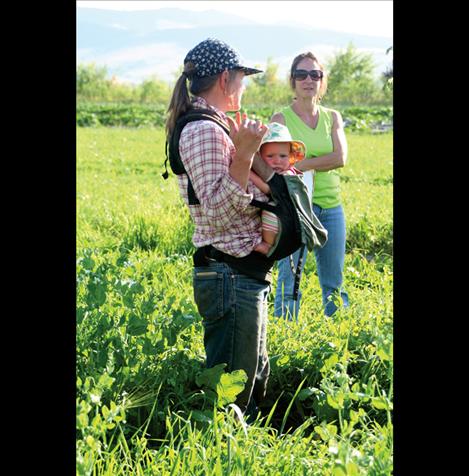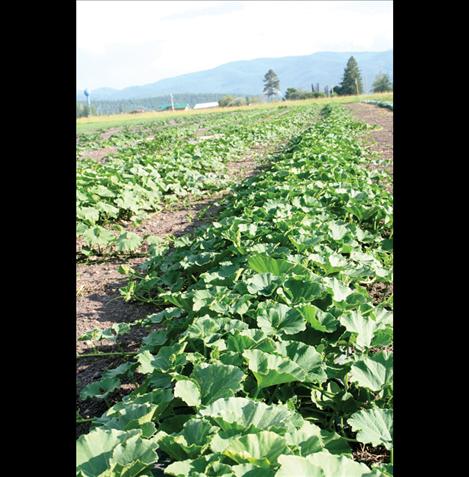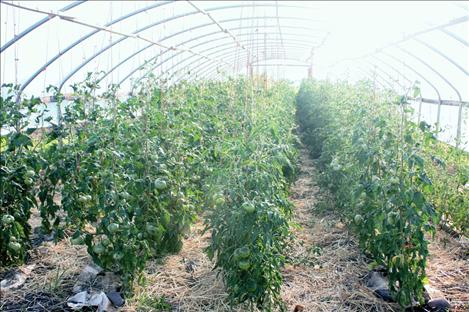Small farmers crop together to learn techniques
Hey savvy news reader! Thanks for choosing local.
You are now reading
1 of 3 free articles.
In a field full of organic squash, shallots, potatoes and artichokes located on Foothill Farm — named after the road it’s on — Julie Pavlock described her farming methods wearing a flannel shirt, jeans and a baby pack where her 7-month-old daughter, Maude, slept.
“I started farming here 10 years ago,” Pavlock said as she guided a tour of 20 people wanting to learn farming techniques through the farm she works with her husband Ben Ferencz and daughter Evelyn, 8.
One of many questions during the tour came from the group as they looked in a hoop house full of green tomatoes still growing on their vines: how to protect the plastic around the hoop houses from the animals?
“The chickens respect the plastic,” she said, asking if anyone else had any advice. The group discussed water-conserving methods like drip irrigation, how to shade lettuce and when to harvest cover crops.
Pavlock explained to the group that when she first started farming not everything respected her boundaries.
“The cows got out and ate all the trees we’d planted,” she said.
Looking at her pasture, Pavlock said she has worked with the Natural Resource Conservation Service on several projects to help improve her farm. She is currently experimenting with rotational grazing techniques using the livestock she has on the farm.
“I’m curious to see what happens in the next few years in the soil with intensive grazing,” she said.
The produce grown on the farm is taken to the Western Montana Growers Cooperative and sold to those purchasing shares. Being part of a co-op allows her to specialize and grow the things she enjoys, like garlic.
“I love the cycle of it. It’s in the ground almost a year. The utility of it. I love everything about it,” Pavlock said.
Pavlock’s interest in growing food started when she was a kid growing gardens with her family in suburban areas.
“I always loved gardening,” she said. “I knew I wanted to work outside.”
She tried living in an area with less access to dirt.
“My husband Ben is from New York. That wasn’t for me. We eventually found this place. A lot of people don’t know they can get into it,” she said of her start with farming. “I knew I wanted to grow vegetables. I like to eat good food. I like the diversity of farming and to contribute to the local economy.”
Ben Montgomery, the district conservationist in Ronan for the NRCS, attended the farm tour. Montgomery travels around Western Montana helping people develop their farms with his background in soil science and water resource management.
“A lot of younger people are getting into farming,” he said. “It’s indicative of how the nation is going: people are caring about their food. Agriculture is exciting. Using sustainable techniques has people energized.”
Annie Heuscher, program manager for the Community Food and Agriculture Coalition of Missoula, attended the event and said she notices more people starting up small farms.
“I see a lot of beginning farmers trying to start up in this area,” she said.
She explained that it’s easier to learn farming techniques from peers instead of the Internet where the information might not be right for the area, which makes farm tours like the one hosted by Pavlock an important tool in farming.
“It’s important for farmers to learn from farmers,” she said. “Coming out in the field, they can say this is how this worked and this is why this worked. It’s easier to learn from peers.”
Tammy Howard with the National Center for Appropriate Technology traveled from Butte to organize the event. She said helping farmers is important to the local food supply.
“We help farmers,” she said. “It’s important to support farmers to help them produce crops.”



















